Until recently, the stone was separated only by the outside of the house, but gradually began to be used for inner cladding. Of course, the primary argument in favor of such a material inside the apartment is its complete environmental friendliness and durability. But today, with natural stones, porcelain tiles or other imitation are rarely popular, which can be glued onto a wall or lay on the floor, and which does not require additional care.
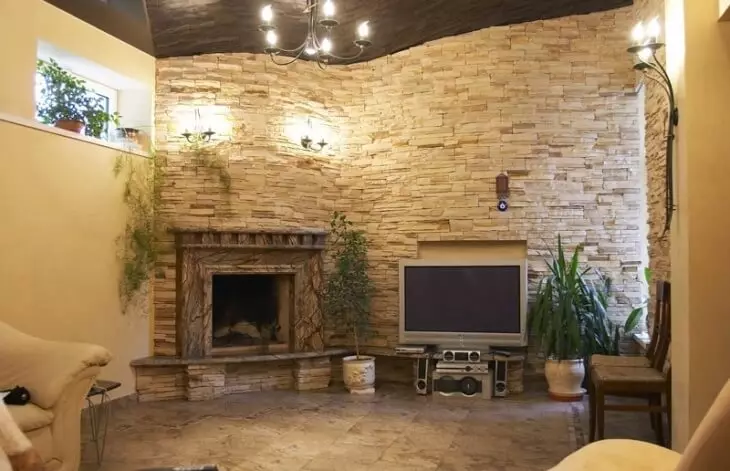
Until recently, the stone was separated only by the outside of the house, but gradually began to be used for inner cladding
Stone in the interior
The use of decorative stone in the interior is due to a number of positive moments, many of which are not available to other materials. I do not see the point of describing the disadvantages of such a cladding, since for different decorative imitation they will be individual, but positive aspects are relevant for all options.
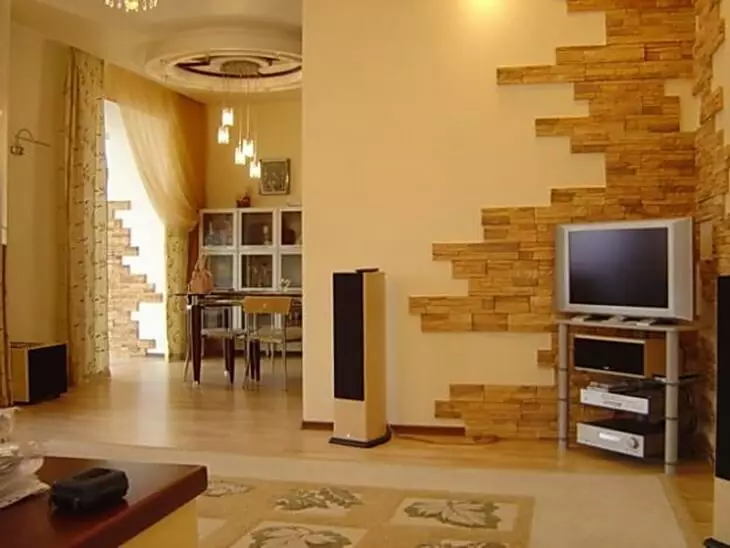
The use of decorative stone in the interior is due to a number of positive moments, many of which are not available to other materials.
Pros:
- Any artificial material weighs significantly less than its reference, which means that the load on the walls is reduced and it can be glued to the tile glue without any problems.
- Almost all types of cladding except, except, porcelain stoneware, resistant to mechanical effects and they are very difficult to damage.
- Some materials used in the interior, for example, liquid stone, are produced with the addition of dyes, despite this, it is not amenable to fading and exposure to ultraviolet.
- Finishing even a large apartment with decorative stone, will not take a long time, and knowing how to put the tile, all work can be done on your own.
- Any artificial option is made only from natural materials without the use of chemical reagents, so it is completely safe, and it is possible to use it even in the interior of the nursery.
- Stone finishing is completely stable even to a large amount of water. It can not only be washed, but also use for lining a bathroom or pool.
Article on the topic: Water warm floor: installation with your own hands, laying scheme and system, installation of heating from an electrocotel
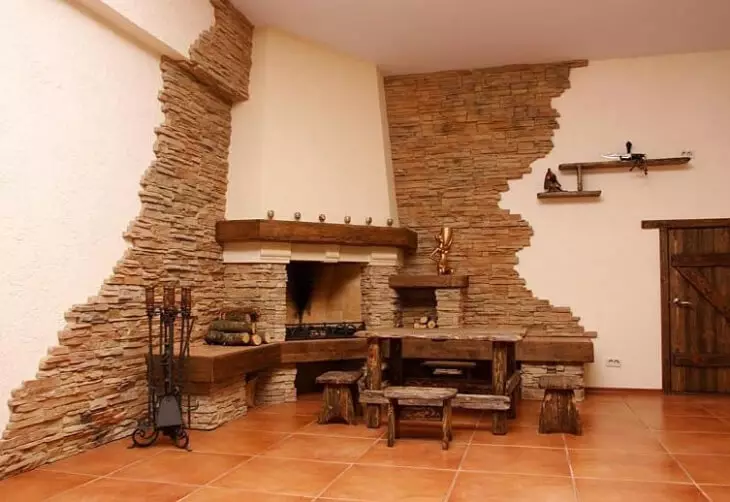
Finishing even a large apartment with decorative stone, will not take much time
Important! Choosing the material for the apartment, you need to take into account the individual features of each room. This applies to both decorative aspects and microclimatic.
Views
The very concept of artificial stone, very generalized and includes a number of materials, some of which are sensitive to moisture or are afraid of sharp objects. In order to avoid errors in choosing, I will describe the most common options and their individual features.
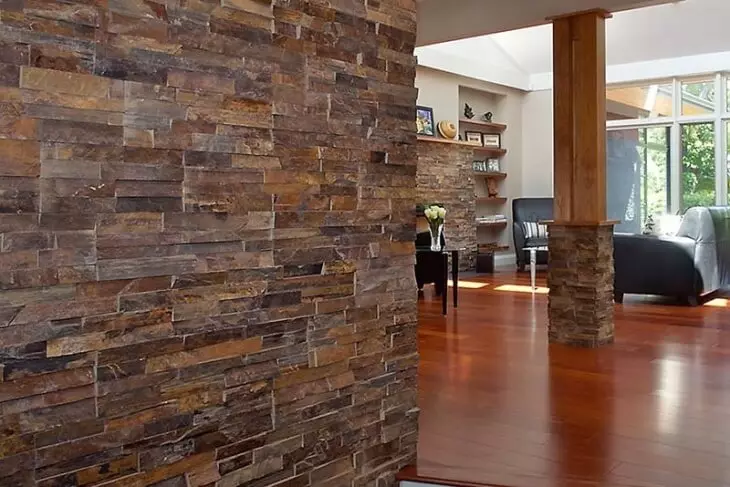
Stone finish can be very diverse
Liquid stone
In essence, nor the word liquid, nor the word stone, do not describe this material. This is an imitation that is made from a mixture of natural marble or granite crumbs and persistent polymers.
The liquid stone is completely insensitive to humidity and does not fade over time. It can not only glue on the walls, but also use as a countertop in the kitchen. Thanks to production technology, liquid stone can be any size and thickness. From it you can create decorative elements in the interior or even put on the floor instead of tiles.
In addition, the liquid stone is cheaper than most of the analogues.
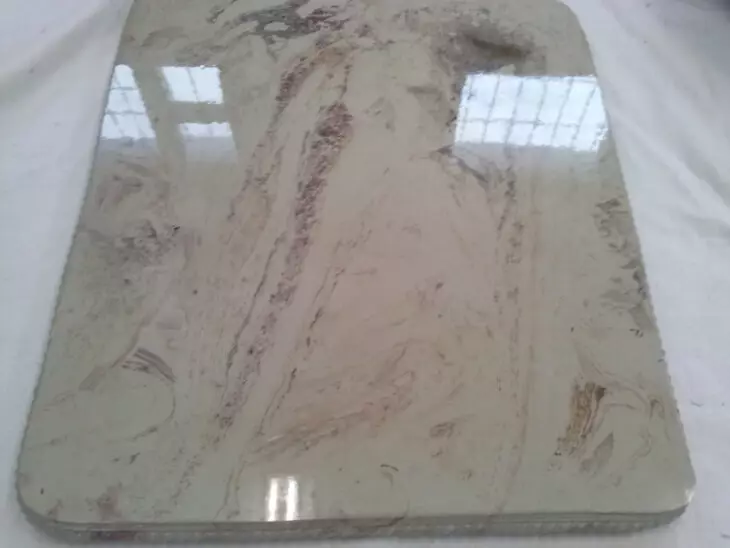
Liquid stone is completely insensitive to humidity and does not fade over time
Ceramographic
Porcelain stoneware can be considered the most famous and popular material for decorative cladding. It is clear from the name that the porcelain stoneware is a mixture of red clay and granite crumbs that are mixed, pressed and burned in the furnace at high temperatures.
As a result of the firing, the surface of the porcelain is becoming a glossy, but it is precisely it is its main minus. This surface is easily scratched, and it is very difficult to renovating damage.
Despite the fact that porcelain stoneware is a finishing material, it is infrequently used in the interior of the apartment. In addition to the easiest surface, it has quite considerable weight, and it is very difficult to glue it on the wall.
Article on the topic: Sports corner for children in the apartment, house
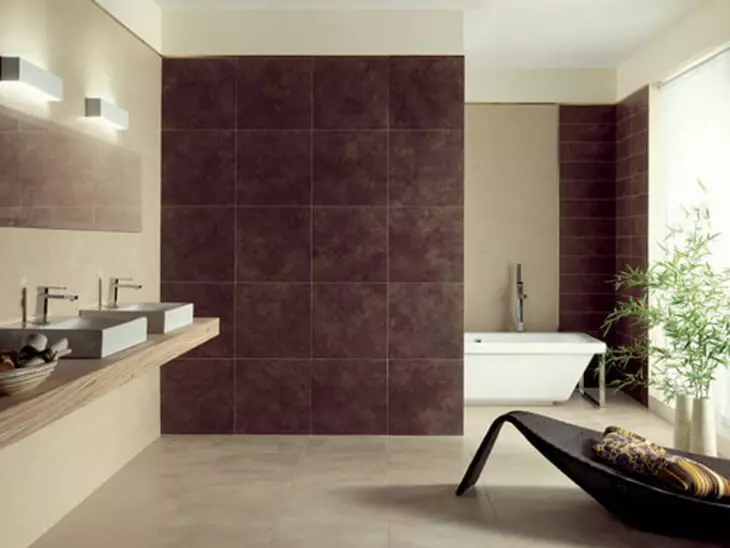
Porcelain tiles can be considered the most famous and popular material for decorative cladding
Concrete or plaster imitation
Based on the production technology, this artificial version is also suitable for the category - "Liquid". Concrete or gypsum solution is poured into special rubber forms with decorative texture. After complete drying and extraction from the form, high-quality imitation is obtained.
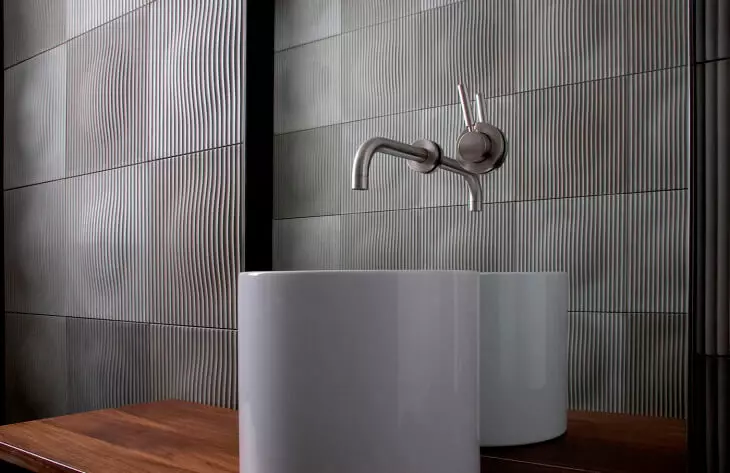
Concrete tile on the wall
Finish such a stone has a number of disadvantages that need to be considered before starting repair work:
- Gypsum is very afraid of water, and even if you apply a protective layer on top, it is still impossible to glue in rooms with high humidity.
- This finish is considered the most short-lived.
- Imitation from concrete or gypsum needs additional painting, since without her finish will look very unattractive.
Despite all the listed flaws, this artificial material is very often used in the interior of the apartment. Such popular is largely due to the cheaper and opportunities of independent production. In addition, it is easy to glue, and the total cladding weight is small.
Important! If you independently do concrete, it is necessary to add reinforcing additives and plasticizers, which significantly increase the qualitative characteristics.
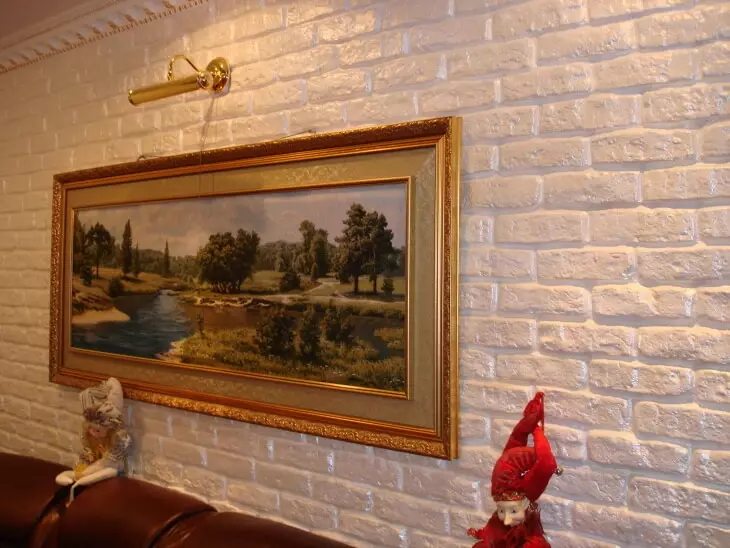
Gypsum imitation
Conclusion
As can be seen, the decoration of the stone can also be very diverse. Not only species of materials repeating the forms of natural stone, but also qualitative characteristics.
Before you choose a stone on the wall, you need to consider many factors from which it will depend on how long the new repair is served.
